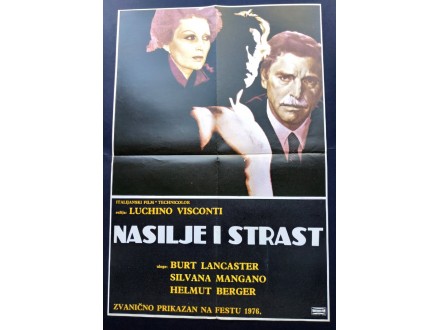NASILJE i STRAST filmski plakat
| Cena: |
| Želi ovaj predmet: | 3 |
| Stanje: | Polovan sa vidljivim znacima korišćenja |
| Garancija: | Ne |
| Isporuka: | Pošta Post Express |
| Plaćanje: | Tekući račun (pre slanja) PostNet (pre slanja) |
| Grad: |
Beograd-Stari grad, Beograd-Stari grad |
Tema: Film
Tip: Plakat
70 x 50 cm
2 x presavijen
MOVIE POSTER
Conversation Piece (Italian: Gruppo di famiglia in un interno) is a 1974 Italian drama film by director Luchino Visconti. The film name refers to an informal group portrait, especially those painted in Britain in the 18th century, beginning in the 1720s. The film explores such themes as the collision between old and new, imminence of death, existential crisis and social gap between generations.
The film features an international cast including the American actor Burt Lancaster, the Austrian Helmut Berger, the Italians Silvana Mangano and Claudia Cardinale (in a very short role as the professor`s wife), and the French actress Dominique Sanda in a cameo as the professor`s mother. The movie was shot in English language; however, an Italian dubbed version was also produced at the time, in which Lancaster`s and Berger`s lines are dubbed into Italian by other actors.[3]
The film was censored in Spain for the nude and political content and because Francisco Franco`s daughter and son-in-law are mentioned. Nevertheless, it was re-released there, uncut, in 1983. The word cunt was removed from its UK original release but restored on the British DVD edition.
A retired American professor (Burt Lancaster) lives a solitary life in a luxurious palazzo in Rome, surrounded by pieces of art and books. He barely maintains contact with people other than his long-time housekeeper Erminia, but even that contact is characterized by detachment. One day the Italian jet set in the form of the rich but vulgar Countess Brumonti (her husband is a right-wing industrialist who does not appear) rings his doorbell. The countess manages to talk the professor into renting the empty apartment on the upper floor of the palazzo to her, her much younger German lover Konrad Huebel (Helmut Berger), her teenage daughter Lietta, and Lietta`s fiancé (or maybe just boyfriend) Stefano.
The professor is calmly disturbed by the pushy new tenants, who immediately have their apartment rebuilt, examine the professor`s apartment for clues to his past, throw parties, and have amorous experiences with each other (including Konrad with the countess`s daughter). But in addition to the annoyance, the professor feels animated by the young people; he is particularly drawn to the provocative, opaque Konrad. Konrad`s past as a gigolo and as a leftist radical in the protests of 1968, who then slipped into drugs, is alluded to—a sharp contrast to the professor`s former completely different life that had been shaped by an aristocratic upbringing and the experiences of World War II. Occasionally the professor sinks into memories of his former wife and mother. The professor and Konrad have a common interest in art and become closer friends after Konrad is beaten up one night because of gambling debts and the professor finds him and provides medical care.
The professor invites the countess, Konrad, Lietta and Stefano to a dinner at which he calls them his `new family` and at the same time expresses satisfaction that they have brought liveliness to his measured life with their move-in. However, a dispute arises among his guests about Konrad`s dubious past and his relationship with the countess. Although she wants to separate from her husband, she does not want to marry Konrad, who is significantly younger and is socially beneath her. Konrad then reveals that he spied on her husband for supporting extreme right-wing groups. This was not for business, but for fear of being arrested in Spain`s Franco dictatorship. The countess and the young conservative entrepreneur Stefano then distance themselves from Konrad. The professor rejects their reactionary views, but does not intervene to support Konrad.
Konrad goes upstairs after saying goodbye to his new `father` by letter he signed `Your son`, suggesting that they would probably not see each other alive again. Immediately afterwards there is a gas explosion in which Konrad is killed. The professor blames himself for Konrad`s death and falls seriously ill. The last scene shows him on his deathbed when the countess visits him with Lietta. The countess tells the professor that Konrad committed suicide, in order to hurt everyone who loved him—but that Konrad was too young to realize that, in time, everyone would forget him. After the countess leaves the room, Lietta tells the professor `Don`t believe her. He didn`t kill himself; they murdered him.` Lietta leaves; the professor is now alone. Becoming overcome with grief or despair, he gazes upward and clasps his hands as though in prayer to God or to something he might long to believe in.
MOLIM CENJENE KUPCE DA ISPOSTUJU PRAVILNIK(ROKOVE) LIMUNDO-KUPINDO TIMA.
ne dajem nikakve popuste.
izlozene cene su KONACNE, bez obzira na kolicinu
NE RAZNOSIM PRODATU ROBU - OVO VAZI I ZA BEOGRAD.
licno preuzimanje predmeta na mojoj adresi (ispred zgrade), posle 18h
naravno, u roku koji se dobije posle prodaje.
placanje na tekuci racun u POSTI - POSTANSKA STEDIONICA
INO KUPCI -- paypal (+5%) (pitati za postarinu)
INTERNATIONAL BUYERS WELCOME
IF YOU HAVE ANY QUESTION REGARDING CONDITION,SHIPPING AND PRICING PLEASE EMAIL US BEFORE YOU BID. THANK YOU !
NOVAC U PISMU - NE PRIMAM.
slanje POSTEXPRESOM (ili VREDNOSNO PISMO)
ako stoji `besplatna dostava`(pored broja pregleda) onda VAZI SAMO ZA SRBIJU
POUZECEM -- N E S A L J E M
komunikacija iskljucivo preko limundo-kupindo poruka
slike se najbolje vide kada se klikne na `Slika u punoj veličini`
Predmet: 67214805







